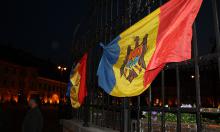Guest opinion: Terminating Al-Sadr will not eliminate Shi'a resistance
 As the U.S. military swarms the Iraqi city of Najaf, a vital decision must be made about whether it is willing to kill Shi'a leader Moqtada al-Sadr.
As the U.S. military swarms the Iraqi city of Najaf, a vital decision must be made about whether it is willing to kill Shi'a leader Moqtada al-Sadr.
Al-Sadr, whose private militia is known as the Mehdi Army, has been a jagged thorn in the side of the U.S.-led occupation. Al-Sadr's influence among the Shi'a community, and his control of thousands of weapon-toting militia, has made him a power force to contend with, a situation that is endangering Washington's attempts to stabilize Iraq.

At first look, terminating al-Sadr would destroy the leadership of the Mehdi Army, perhaps precipitating its collapse. However, al-Sadr is more a product of societal conditions in Iraq than an influencer of them; the failure of Washington to effectively stabilize Iraq has transformed al-Sadr into a popular figure who speaks to the anger and resentment that a segment of Iraq's population holds toward the U.S.-led occupation. Viewing the situation from this perspective, the termination of al-Sadr would simply eliminate a figurehead, and the Shi'a resistance to the U.S.-led occupation would surge forward.
Background
Al-Sadr, alleged to be about 31 years old, is the son of respected Shi'a cleric Mohamed Sadeq al-Sadr, who was assassinated by Saddam Hussein's Ba'ath Party in 1999 due to his outspoken criticism of its policies. Shortly after the U.S.-led invasion, al-Sadr and his militia recognized the power vacuum that had been created and quickly supplied food and essential supplies to Iraqis suffering the hardships of war. But it was his public, charismatic and outspoken defiance of the U.S.-led occupation that earned him the most respect.
Following Washington's attempts to silence him, the leader called his militia into violent action and engaged in open warfare with U.S.-led forces. The size and dedication of his militia caught U.S. military leaders off-guard, and al-Sadr managed to bring an unacceptable level of casualties to U.S. forces, raising domestic alarm back in the United States.
Al-Sadr's intransigence continued, and the failure of Washington to appropriately isolate him among the Iraqi populace made it difficult to stunt his growing power. His bold actions spoke to the popular anger held by many Iraqis over the failure of the U.S. to stabilize Iraq. After his initial April 2004 uprising, al-Sadr's popularity quickly surged, making it unwise for U.S. forces to eliminate him from the power equation due to fear of turning him into a martyr.
But the failure of Washington to terminate al-Sadr has given him the opportunity to consolidate his power within the Shi'a leadership, and continue to augment his military might. Unwilling to let this conundrum continue, the Pentagon launched a major military campaign against al-Sadr and his militia, vowing to "finish" him. In the words of Colonel Anthony Haslam, the commanding officer of the 11th Marine expeditionary unit, Iraqi and U.S. forces are going to "finish this fight that the Moqtada militia started."
National Ramifications of the Najaf Offensive
Nevertheless, killing al-Sadr is fraught with dangers. For one, his death could transform him into a martyr and intensify the anger held by the Shi'a community toward the U.S.-led occupation. Such an action could also easily anger other segments of the Iraqi populace. Upon al-Sadr's death, his militia would survive, and it would likely only be a short time until a new leader would arise to take al-Sadr's place. Capturing al-Sadr could also prove fruitless since he only represents a movement, and is not the movement itself.
Al-Sadr understands this and is capitalizing on these scenarios by issuing statements meant to show his courage and defiance toward U.S.-led forces. For example, al-Sadr recently stated, "I hope that you keep fighting even if you see me detained or martyred." He also promised that he would fight "until the last drop of blood."
The other danger involved in the termination of al-Sadr is the force that will be necessary to achieve such a result. Al-Sadr has smartly holed himself up in Najaf, one of the holiest cities to Shi'a Muslims. It is the location of the Shrine of Imam Ali Ibn Abi Talibwhere the remains of the son-in-law to the prophet Mohammad are buried, and the second holiest site in the world for Shi'a Muslims. The shrine, which is topped by a brilliant golden dome and minarets, contains large amounts of treasure and invaluable antiques accumulated over centuries. More than one million religious visitors come to the shrine each year, and come also to an enormous cemetery adjacent to the shrine known as the Valley of Peace, a location where much fighting between the Mehdi Army and U.S. forces has already taken place.
Because al-Sadr and his fighters have sought shelter in this area, in addition to using it as a bunker for attacks against U.S. forces, it will be extremely difficult to eliminate him without damaging the shrine of Imam Ali. If U.S., or even Iraqi, forces were to damage the shrine in their attacks against the Mehdi Army, it could cause a massive rising tide of popular anger against U.S.-led forces there.
Such anger could result in a new popular uprising against U.S.-led forces, a development that would further destabilize the Iraqi state. The last time that Najaf was under siege was during the rule of Saddam Hussein, in which he assaulted the city to put down an uprising in 1991. While Saddam succeeded in storming the shrine and killing the militants inside, his perceived disrespect of such a holy site turned most Shi'a against his rule, even those who had supported him in the past.
Indeed, as U.S. forces prepared for their assault on Najaf, thousands of Shi'a took to the streets in Nasiriyah and set fire to the office of Interim Prime Minister Ayad Allawi's political party. Once U.S. and Iraqi forces began to finally assault Najaf, 5,000 al-Sadr sympathizers marched through the streets of Basra, demanding that the siege end immediately. Also, in Nasiriyah, workers at an oil-pumping station halted operations to protest the government's backing of the U.S. offensive in Najaf. A statement released by the workers explained, "We stopped pumping in protest of the inhuman conduct of the interim government and its cooperation with the occupation forces to ransack the holy city of Najaf and insult the Shi'a, their symbols and holy places."
Furthermore, sixteen members of Najaf's 30-member provincial council resigned in protest of the offensive. Speaking to the press, the council said, "We have decided to resign due to what has befallen Najaf and all of Iraq from the hasty U.S. invasion and bombardment of Najaf."
In an interview with USA Today, retired Army general Daniel Christman succinctly explained the implications of further alienating the Shi'a population: "The great vulnerability we have is to turn the mass of the Shi'a population against the coalition. We can win every tactical battle but lose the war if we don't put the individual engagements inside a larger political context."
Global Ramifications of the Najaf Offensive
Finally, the global ramifications of eliminating al-Sadr must be carefully considered. Not only could damage to the shrine cause a new popular uprising against U.S.-led forces inside Iraq, it could also precipitate more instances of "blowback" on U.S. interests throughout the world. Because Shi'a Muslims are located across the globe -- especially in Iran, Lebanon, Afghanistan, Tajikistan, India and Pakistan -- any damage to Najaf's holy sites could help stir violent hatred toward the United States among this religious group.
Therefore, any movement to eliminate al-Sadr has to be cautiously weighed against the positives and negatives of such a policy decision. While al-Sadr has proven to be a very difficult power force to contend with, he has fortified himself quite well, and attempts to remove him from the power equation could cause the opposite effect and actually strengthen those forces that are calling for the removal of U.S.-led troops from Iraq, in addition to increasing the chances of another terror attack against U.S. interests either at home or abroad.
Erich Marquardt,
PINR
PRAVDA.Ru has a content licensing relationship with the Power and Interest News Report (PINR)
Subscribe to Pravda.Ru Telegram channel, Facebook, RSS!




